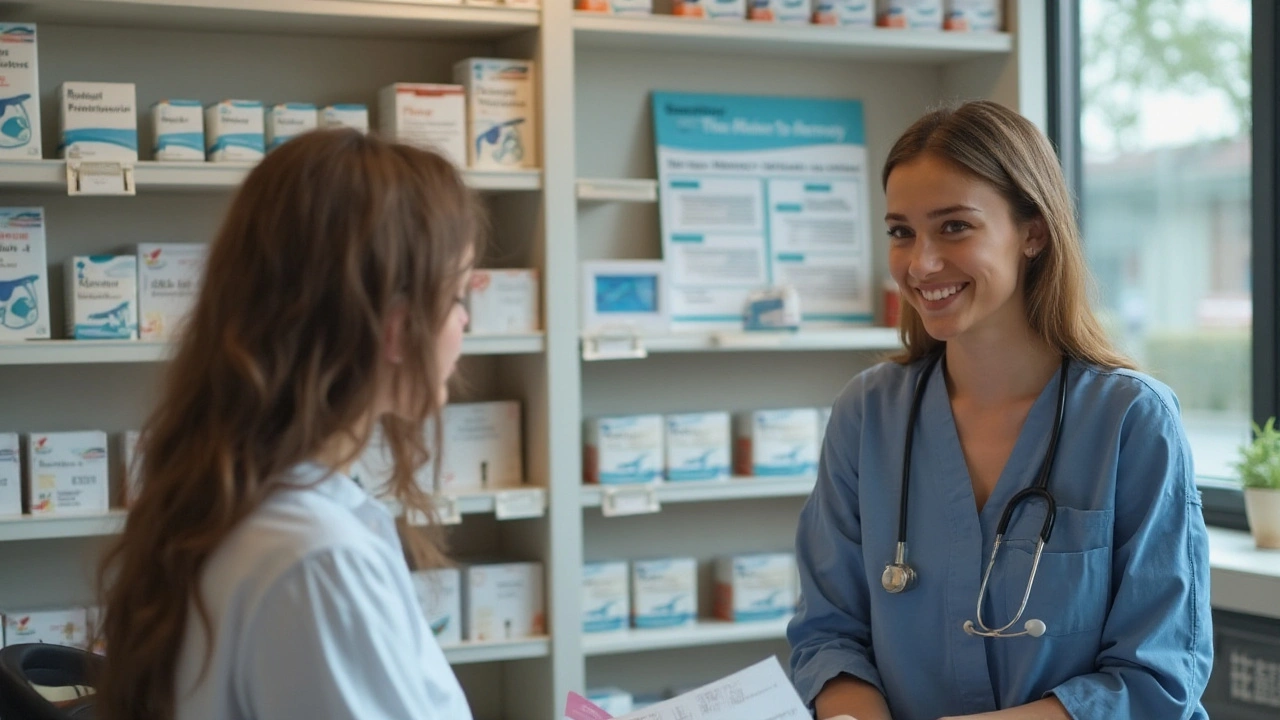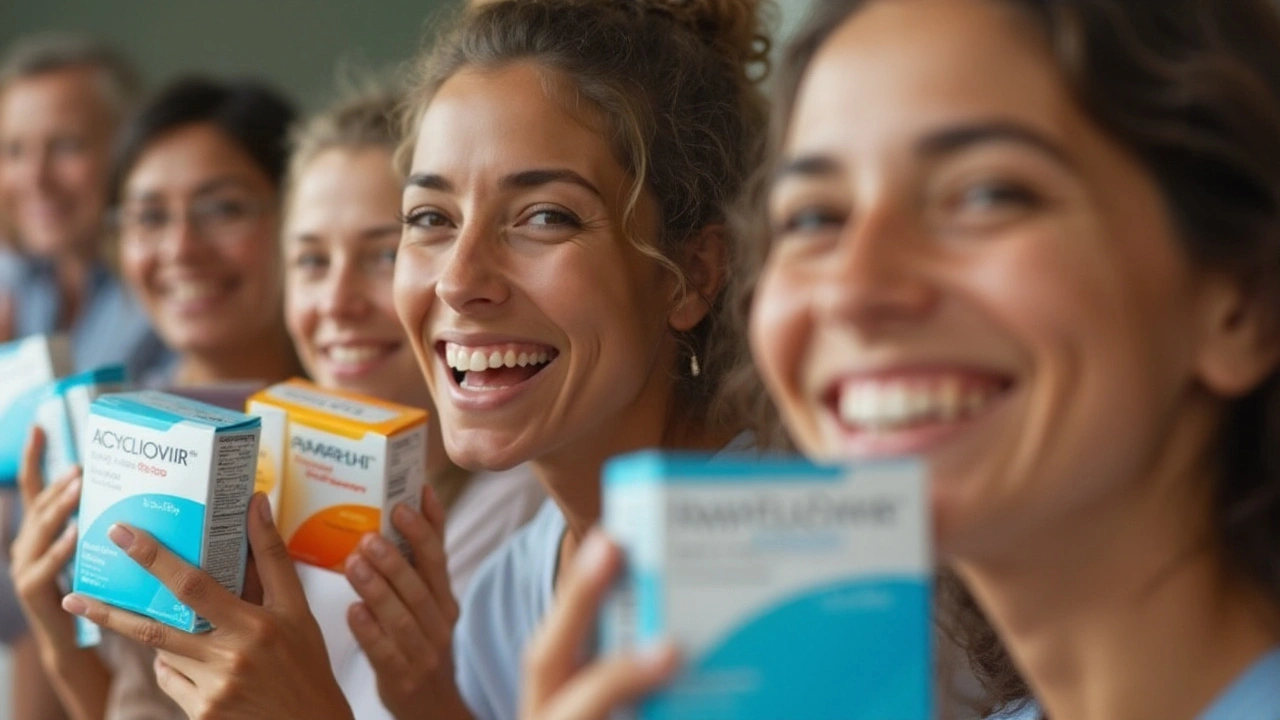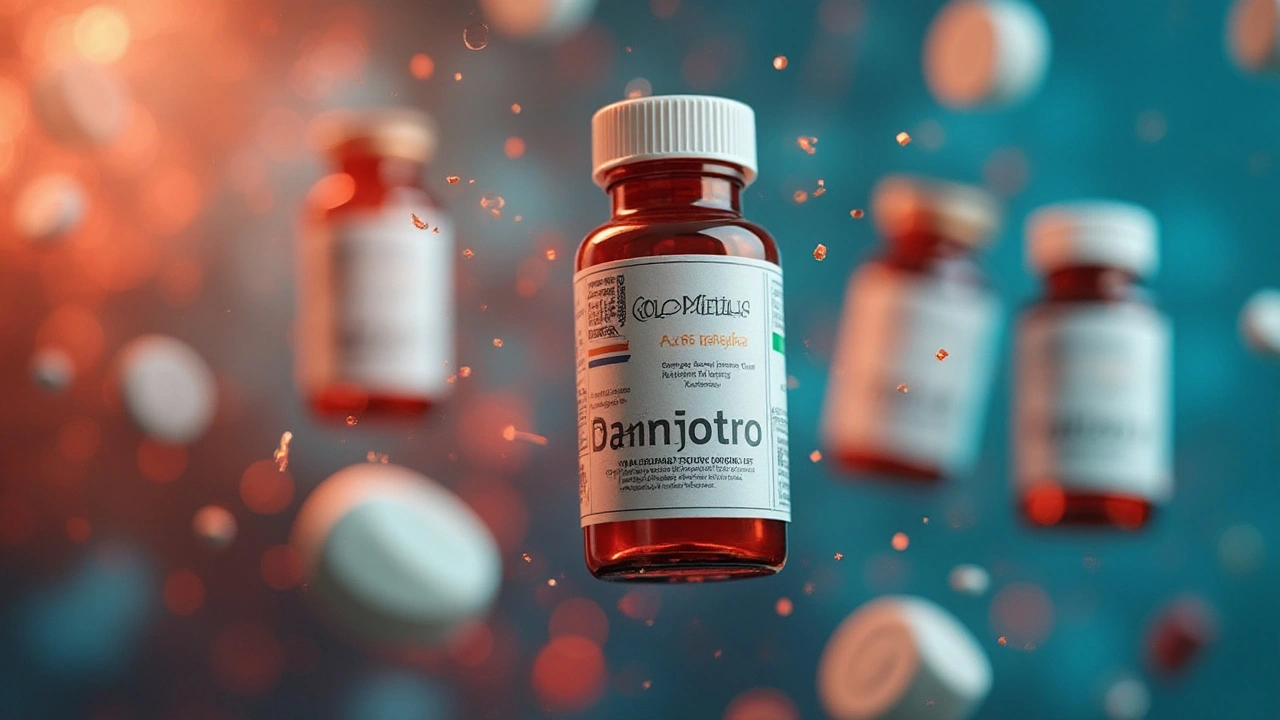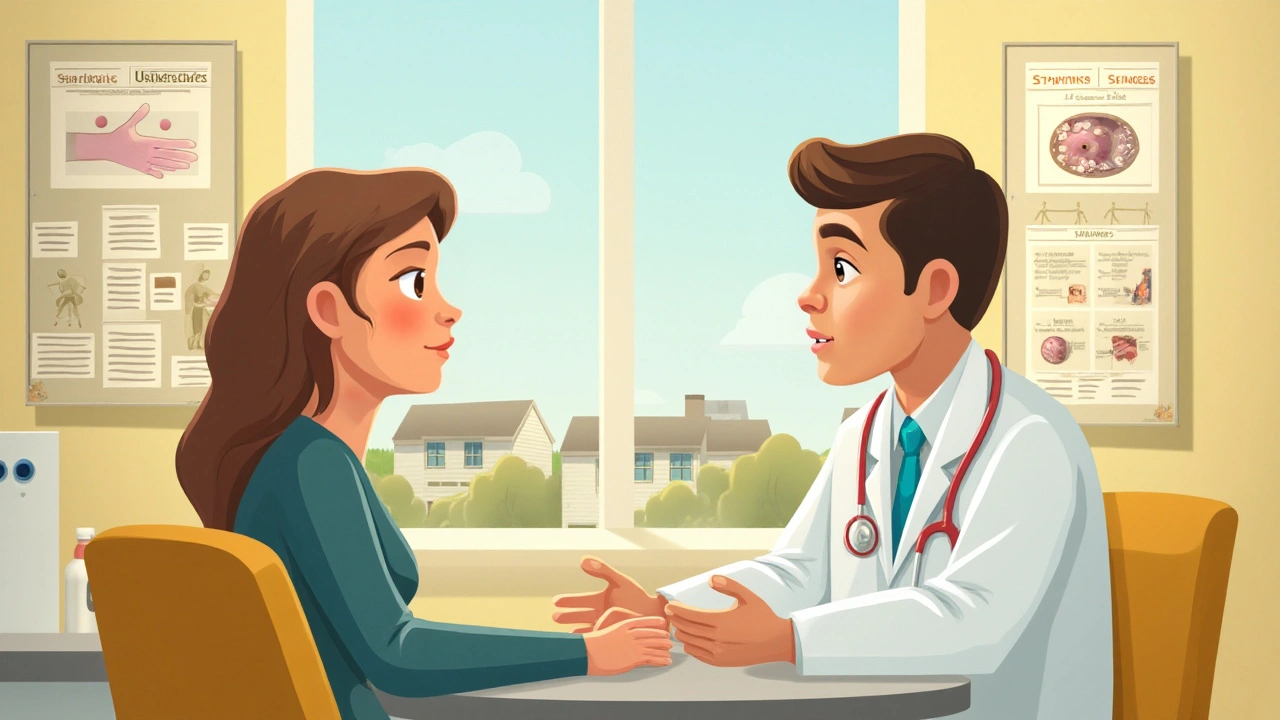
When managing the herpes simplex virus, it's crucial to find a treatment that matches your medical needs and lifestyle. Valtrex is often prescribed, but it isn't the only option available. In 2024, several alternatives offer effective solutions tailored to different types of herpes viruses, from shingles to cold sores. It's important to understand the strengths and limitations of each medication.
This article will explore six alternatives to Valtrex, shedding light on their various forms, effectiveness, and availability. By evaluating these options, you'll gain a clearer understanding of what might work best for your specific situation.
Acyclovir
Acyclovir is one of the most well-known antiviral medications available today, particularly famed for its use in the treatment of the herpes family of viruses. First discovered in the 1970s, this drug has stood the test of time due to its effectiveness and adaptability in form. It's available in tablet, capsule, and topical cream versions, allowing for flexibility in treatment approaches depending on the severity and nature of the infection. Patients often hear it referred to by its brand name, Zovirax, in pharmacies and healthcare discussions. What makes Acyclovir a necessary option in the arsenal against herpes is its ability to selectively target the viral replication process without affecting human DNA, resulting in a medication that's not only effective but generally safe for prolonged use.
Herpes viruses, whether they're the cold sore-inducing HSV-1, the genital HSV-2, or the shingles-causing herpes zoster, are hindered from replication thanks to Acyclovir, which incorporates itself into the viral DNA chain. This action effectively halts the virus from multiplying, buying the immune system more time to deal with the infection. Yet, Acyclovir isn't just about stopping flare-ups; it's also used in long-term maintenance therapy, providing consistent viral suppression. Patients with frequent outbreaks might find their episodes significantly reduced, both in frequency and severity, when on a steady regimen of Acyclovir. However, this comes at a small price—one of the main drawbacks is its lower bioavailability compared to newer drugs like Valacyclovir, meaning it requires more frequent dosing to maintain effectiveness.
The effectiveness of Acyclovir has been underscored in numerous studies. According to the Centers for Disease Control and Prevention, Acyclovir can reduce the duration and severity of outbreaks when used promptly after the appearance of initial symptoms. This is critical because the speed at which the virus's replication is halted directly impacts the time it takes for an outbreak to resolve. Despite its frequent dosing schedule, many users report high satisfaction with the drug due to its well-tolerated nature. Side effects are typically mild, with nausea, diarrhea, and headaches being the most common proverbial guests in the user's experience, but these are generally less severe, especially when compared to the therapeutic benefits they gain.
A case study published in the New England Journal of Medicine asserted that "Acyclovir remains a cornerstone therapy for herpes infections owing to its remarkable safety profile and consistent efficacy across various population groups."
When considering switching from Valtrex to Acyclovir, patients often weigh the pros of their dosing convenience against other factors like cost and availability. Acyclovir maintains an advantage in terms of affordability, making it a viable option for those without insurance or with limited healthcare budgets. As it's been available for a longer time, generic versions can further lower the cost, widening the accessibility to broader patient demographics.
In a balanced view, Acyclovir shines as a trusted, reliable treatment for herpes, especially when cost and access are factors in choosing antiviral therapy. It has a robust historical backing and, for many, continues to be the go-to medication that ensures their quality of life is maintained despite living with a chronic viral condition. This legacy and ongoing application validate its status as a significant alternative to Valtrex in 2024.
Famciclovir
Famciclovir is a significant player in the realm of herpes treatment, particularly for those dealing with shingles and genital herpes. As an oral antiviral drug, it transforms into penciclovir once in the body, targeting the herpes virus with notable precision. This conversion process gives famciclovir an edge, especially when it comes to its bioavailability. Compared to its relative, acyclovir, famciclovir boasts better absorption in the gastrointestinal tract, which means more of the active ingredient is available to do its job in fighting the virus.
Patients appreciate famciclovir because of its dosing convenience, which often requires fewer doses per day. This aspect can greatly improve adherence to the medication regimen, a critical factor in achieving optimal outcomes in herpes treatment. It's typically prescribed for conditions like shingles, which can otherwise cause debilitating pain and discomfort. The drug's effectiveness in reducing pain and speeding up healing makes it a go-to for physicians looking for alternatives to Valtrex.
Unlike some other antiviral treatments, famciclovir is less commonly prescribed for conditions like cold sores or oral herpes (HSV-1). However, it is notably efficient against genital herpes (HSV-2) and offers relief to those plagued by recurrent outbreaks. This specificity underscores the importance of tailoring treatment plans based on the type of herpes infection, ensuring the most effective medication is chosen for the job. In some studies, Famciclovir has been shown to be particularly effective at reducing the frequency of outbreaks in individuals with recurrent genital herpes, offering a sense of normalcy and control over an often-disruptive condition.
Research into famciclovir continues to evolve, with recent studies highlighting its potential in various formulations. This includes both mainstram tablets as well as more experimental delivery methods which can further improve patient compliance and outcomes. The aim is to expand its use beyond the current limitations, potentially making it a more universal choice for various herpes-related conditions. According to a recent review in the Journal of Antiviral Research, famciclovir shows promise due to its robust efficacy and patient-friendly dosing schedule.
The right medication can significantly change the quality of life for those affected, said Dr. Lena Rowe, a leading virologist at the University of Southern California.This continuous research signifies a hopeful future for this specific alternative to Valtrex.

Penciclovir: An Effective Solution for Cold Sores
Penciclovir is recognized in the medical community for its targeted action against cold sores, a common manifestation of the herpes simplex virus. Available primarily as a topical cream, this antiviral medication effectively blocks the virus's replication, curbing the outbreak before it becomes severe. Many patients find Penciclovir particularly appealing because of its application method, which allows for direct delivery to the affected area, promoting swift healing and alleviating discomfort. This approach not only accelerates recovery but also minimizes the chances of spreading the virus further, making it a reliable choice for those frequently struggling with cold sore flare-ups.
One noteworthy aspect of Penciclovir is its general tolerability, with many users experiencing no significant side effects. This enhances its desirability, especially when compared to systemic treatments that might carry more extensive side effect profiles. Clinical studies have compared Penciclovir's efficacy to other treatments, noting its comparable effectiveness in reducing the duration and severity of cold sores. While many patients appreciate that it is available over-the-counter, its impact largely depends on timely application, often recommended at the first sign of an outbreak to maximize benefits.
A particular challenge with cold sore treatments is ensuring swift symptom relief without extensive side effects. Here, Penciclovir shines due to its focussed mechanism, which lessens viral spread effectively when used consistently. A typical regimen involves applying the cream every two hours while awake, a routine that might seem demanding but is often rewarded with quicker healing. The topical nature of this medication allows for fewer systemic side effects, a compelling reason for its recommendation by many healthcare professionals.
Dr. Elizabeth Tanzi, a dermatologist, once pointed out, "For patients frequently impacted by cold sores, Penciclovir provides a potent, well-tolerated option that's easy to apply and works effectively at the infection site."
While it's a compelling alternative, particularly for those focused on treating surface-level symptoms, Penciclovir is limited in its application beyond cold sores. This distinction means that while it excels in treating external symptoms, it's not the go-to answer for systemic herpes infections. However, its convenience and efficacy make it a staple in treatment options for cold sores specifically. Understanding your situation and the scope of what needs treating is crucial in determining if Penciclovir is the right choice for you.
Docosanol: A Topical Solution for Cold Sores
If you've ever had a cold sore, you know how frustrating they can be. Enter Docosanol, a topical antiviral treatment often marketed under the brand name Abreva. It's an over-the-counter medication specifically designed to tackle cold sores, a result of the herpes simplex virus (HSV-1). What makes Docosanol stand out is its ability to block the virus from invading healthy cells, effectively cutting off its ability to multiply.
Docosanol is unique because it is widely accessible at pharmacies without needing a prescription, making it a convenient choice for many. It's crucial to apply it at the first sign of a cold sore—usually a tingle or itch to stop the virus in its tracks. When used correctly, studies have shown that Docosanol can reduce healing time by a day or more, which may not sound like much but is significant when you're dealing with an unsightly and often painful outbreak.
While Docosanol is effective at handling cold sores on the lips and around the mouth, it's important to note that it doesn't work against systemic herpes infections, such as genital herpes or shingles. So, while it offers a specific solution, its application is limited. It's also worth mentioning that some users might experience minor skin irritation at the application site, although this is relatively rare.
"Docosanol delivers a crucial line of defense against cold sores by interfering with the virus's ability to infect host cells," says Dr. Jane Anderson, a renowned virologist at University Health Center.
Some might wonder about Docosanol's effectiveness compared to other cold sore treatments. While studies confirm it as a solid option, it's one among many. Its standout feature is the ease of use as a non-prescription treatment that is easy to carry and apply throughout the day. When you consider other treatments might require multiple doses or have more intense side effects, Docosanol remains a favorable choice due to its ease and relatively minimal risk profile.
According to recent surveys, users frequently rate Docosanol favorably in terms of satisfaction and perceived effectiveness. This indicates it doesn't just work in controlled studies but also resonates with real-world users. The fact that it is well-tolerated adds an extra layer of attractiveness, especially for those who might struggle with stronger medications or prescriptions. If you're looking for a targeted yet simple solution, Docosanol is certainly a contender worth considering.

Brivudine
Brivudine is an intriguing alternative to consider, especially for those dealing with herpes zoster, commonly known as shingles. Unlike some other medications, brivudine's mechanism of action is focused entirely on halting the virus in its tracks. By blocking its replication, it prevents the virus from spreading further within the body. This antiviral is not as well-known as acyclovir or famciclovir, but in certain regions, especially in Europe, it is gaining traction for its efficacy against shingles.
The availability of brivudine varies globally, making its reach somewhat limited compared to the more popular alternatives. While it excels in treating shingles, one of the conditions caused by the herpes zoster virus, it remains less frequently prescribed in areas outside its primary marketing regions. Patients report that it's generally well-tolerated with fewer adverse effects, which can make it a preferable option for those particularly sensitive to medications. Brivudine's ability to reduce the duration and severity of symptoms quickly is highly valued, making it a contender in the antiviral market.
In some studies, such as those published in respected medical journals, brivudine has demonstrated a distinct advantage over older treatments. This can be partly attributed to its unique design and the fact that it is specifically engineered to treat shingles efficiently. Its application isn't as broad as some other antivirals, but its specialization means it can deliver superior outcomes for patients already diagnosed with herpes zoster. This focused treatment strategy means fewer doses are required, improving compliance among patients who may struggle with regular medication schedules.
“Brivudine shows promise in quickly resolving shingles outbreaks, providing relief where other medications have faltered,” notes Dr. Friedrich, a dermatologist in the field of virus research.
Considering the pros and cons of brivudine includes weighing its limited accessibility against its promising results. Patients seeking alternatives to Valtrex might find brivudine advantageous if they can access the drug. It’s crucial to engage in a discussion with a healthcare provider to ascertain if brivudine is suitable for them, bearing in mind that its suitability might vary from one individual to another. When selecting an antiviral, one must consider both the type of herpes being treated and personal health circumstances, ensuring the chosen treatment aligns well with their lifestyle and medical needs.
Ibacitabine: A Promising Hope for Herpes Treatment
In the intriguing landscape of herpes treatment, Ibacitabine emerges as a notable contender. Currently under experimental stages, this antiviral drug has shown a significant potential to combat herpes simplex virus infections. As the scientific community continues to explore its capabilities, many hope it will offer a new line of defense for patients worldwide. Few things stoke curiosity like the promise of a medical breakthrough, and Ibacitabine has managed to do just that. Its mode of action centers around inhibiting the replication of the virus, which essentially throttles the virus's ability to spread. This characteristic not only enhances its potential effectiveness but also suggests a future with less frequent dosing compared to existing treatments.
How does Ibacitabine fare when compared to currently available options like Valtrex or Acyclovir? Researchers suggest that it could offer improved efficacy, particularly in those who have developed resistance to other drugs. There's a growing interest in the medical field regarding its capability to handle stubborn infections that other medications struggle with. Yet, the drug is still on its journey through rigorous clinical trials, which means its safety and efficacy require further validation. Until those trials are completed, healthcare professionals and patients must wait patiently, balancing optimism with caution.
Promising Yet Experimental
The journey of Ibacitabine is much like the saga of many groundbreaking drugs – filled with potentials yet shrouded in uncertainties. Scientists remain cautiously optimistic about what this drug can offer. Initial studies suggest it might provide relief with potentially lower side effects, but without widespread availability and complete clinical data, nothing is set in stone. The excitement around Ibacitabine isn't just about its impact on herpes simplex virus. If successful, this drug could pave the way for broader applications in antiviral therapies, expanding its reach beyond herpes. However, until it gets the green light, the medical community stresses that patients continue to rely on tried-and-true treatments along with professional medical advice.
"Ibacitabine's potential is indeed intriguing, but like all experimental drugs, it must clear the hurdles of thorough testing. Only time will tell if it becomes a cornerstone in the fight against herpes viruses," says Dr. Emily Carter, a leading virologist who has been closely following its development.

Conclusion
As we navigate through 2024, the landscape for managing herpes infections offers several effective alternatives to Valtrex. Each of these medications brings its own unique strengths, catering to different facets of herpes treatment. Choosing the right antiviral medicine depends on a range of factors like the specific virus type, frequency of outbreaks, and personal medical history. Always remember to consult with a healthcare provider to find the most suitable option for individual needs. With options like Acyclovir, Famciclovir, and others, patients can manage their conditions with more precision and control.
A closer look at each option reveals fascinating insights. For instance, Acyclovir remains a staple due to its versatility and wide range of forms. Yet, for those seeking fewer doses per day, Famciclovir presents a compelling case, especially in treating conditions like shingles more efficiently. Equally, Brivudine provides a potent choice for treating shingles, though its availability is more restricted geographically. Harnessing the future potential of treatments, Ibacitabine shines as a beacon of hope, pointing to future developments in antiviral medications.
"Choosing the best treatment plan for herpes requires balancing efficacy with convenience, all tailored to individual health needs," notes Dr. Emily Tran, a renowned virologist.
For localized outbreaks, topical treatments such as Penciclovir and Docosanol allow targeted relief, focusing directly on cold sores. Despite being restricted to topical application, their efficacy in managing external symptoms shouldn't be underestimated. By blocking viral replication and entry effectively, they provide rapid relief with minimal systemic involvement. It's noteworthy how each of these medications aligns to specific virus strains, offering a customized approach to herpes management.
Comparative Overview
To better understand these options, consider the following comparison which highlights availability, dosing, and specific uses:
| Medication | Availability | Dosing Frequency | Major Uses |
|---|---|---|---|
| Acyclovir | Widely Available | Frequent | HSV-1, HSV-2, Shingles |
| Famciclovir | Limited to Oral | Less Frequent | Shingles, Genital Herpes |
| Penciclovir | Topical | As Needed | Cold Sores |
| Docosanol | Over-the-counter | As Needed | Cold Sores |
| Brivudine | Region-Specific | Once Daily | Shingles |
| Ibacitabine | Experimental | Uncertain | Potential HSV Improvement |
While Valtrex alternatives continue to evolve, it's clear that the broader choice greatly empowers patients, paving the way for improved outcomes. These options open up discussions with healthcare providers, leading to better-tuned treatment plans. As research advances, the spectrum of treatments is likely to expand, providing even more targeted options tailored to individual health profiles.





Comments (5)
stephen riyo
Acyclovir? Pfft. I’ve been on it for 7 years. You think it’s cheap? Try paying $200 a month without insurance. Valtrex might be pricier but you only take it twice a day-less hassle, less nausea, less forgetting. I don’t care how ‘proven’ it is-I care about my sleep schedule.
And don’t get me started on penciclovir cream. I apply it at 7am, 9am, 11am, 1pm, 3pm, 5pm, 7pm… I’m not a pharmacist, I’m a human being with a job.
Docosanol? It’s like putting tape on a leaky boat. It helps, sure. But I still feel the cold sore screaming inside my lip.
Brivudine? I looked it up. It’s not even sold in the U.S. So why are we even talking about it? Just sayin’.
Ibacitabine? Sounds like a sci-fi drug from 2078. I’ll wait until it’s on CVS shelves. Until then, I’m sticking with my $12 generic acyclovir and a prayer.
Wendy Edwards
okay but like… i just got my first cold sore in 3 years and i used docosanol and it was gone in 2 days?? like no joke. i didnt even need to cancel plans. i was so scared it was gonna be a full-blown outbreak but it just… faded. like a ghost.
and i didnt even need a prescription. i grabbed it next to the gum and mints like it was a candy bar. i feel like we overcomplicate this stuff. sometimes the simplest thing works best.
also famciclovir? my cousin swears by it for her genital herpes. she says it’s the only thing that stops the pain before it even starts. i’m gonna ask my dr about it next time.
and acyclovir? yeah it’s old but it’s like your grandma’s soup-tastes like home and still works. i’m not mad at it.
ibacitabine sounds like a superhero name. i hope it comes soon. we all deserve to stop worrying about herpes like it’s a secret shame.
Jaspreet Kaur
life is a virus and we are all just trying to survive the outbreak
valtrex is not the enemy. the enemy is the fear that we are broken because we carry something invisible. every pill we take is not a surrender-it’s a quiet rebellion against shame.
acyclovir is the grandfather. penciclovir is the gentle aunt. docosanol is the friend who shows up with ice cream and doesn’t ask questions.
brivudine? maybe it’s the monk who meditates in the mountains and only appears when the storm is worst.
and ibacitabine? that’s the future whispering through the trees. we don’t need to rush it. we just need to believe it’s coming.
you are not your virus. you are the person who still showers. who still kisses. who still laughs. that’s the real treatment.
no pill can give you that. only you can.
Gina Banh
Stop pretending famciclovir is better than valtrex. It’s not. Bioavailability? Sure. But valtrex converts to acyclovir in your body-so you’re literally getting the same drug with fewer pills. That’s not magic, that’s chemistry.
Penciclovir? Great for cold sores. But if you’re having genital outbreaks, it’s useless. Don’t waste your money.
Docosanol? Overhyped. It delays healing by 24 hours. Big whoop. You still look like a pimple-faced zombie for 5 days.
Brivudine? Only available in 3 countries. If you’re in the U.S., stop scrolling. It doesn’t exist for you.
Ibacitabine? Still in Phase 2 trials. Stop treating experimental drugs like they’re on Amazon Prime.
Bottom line: Acyclovir is the baseline. Valtrex is the upgrade. Everything else is a sidequest. Stop overcomplicating your treatment. Talk to your doctor. Not Reddit. Not some blog. A real person with a license.
Deirdre Wilson
my first cold sore felt like a tiny firework inside my lip. i cried. then i bought docosanol. it didn’t fix it. but it made me feel like i was doing something. like i wasn’t helpless.
and now? i don’t even panic anymore. i just smile at the little bump and say, ‘hey buddy, you’re late this time.’
it’s wild how something so small can make you feel so big. like you’re not just a body with a virus-you’re a person who remembers to eat, to laugh, to text your best friend even when your lip is swollen.
and yeah, maybe acyclovir is old. but old things? they stick around for a reason. like your favorite hoodie. or your grandpa’s laugh.
we’re all just trying to live with our little hidden storms. and honestly? that’s the bravest thing there is.